使用vba程序,实现excel数据库模板生成sql数据库结构
@
最近公司有个需求,提前让数据库表结构在excel模板中设计,然后再建对应的数据库DB。字段少好说,无脑录入即可,但是,我遇到个100多个字段的,实在忍不了,最终入门了VBA编程,自己写脚本生成了sql语句。减少了需要无用重复劳动。
VBA基础
首先学习下vba的基础。
一.了解VBA
1.进入vba
alt + f11
文件 - 选项 - 自定义功能区 - 勾选开发工具
2.认识宏
-
录制宏
-
使用相对应用录制宏
二. VBA编程
1.hello world
双击某个sheet页, 把鼠标放在 窗口里面,点击工具栏的插入,选择过程,随便起个过程名,比如 class就生成了代码:
Public Sub class()
End Sub
写个hello world程序:
Sub class()
Dim name
name = "Hello World"
name = "胡老师好"
MsgBox name
End Sub
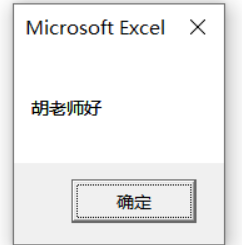
2.调出立即窗口和本地窗口
在工具栏中选择 选择立即窗口,和本地窗口。
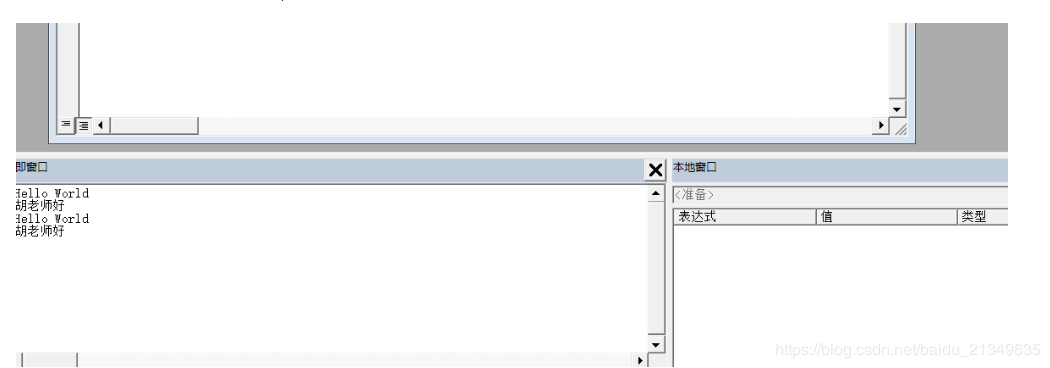
3.debug显示
Sub class()
Dim name
name = "Hello World"
Debug.Print name
name = "胡老师好"
MsgBox name
Debug.Print name
End Sub

4.注释
注释有2种形式,一种是rem。一种是 ' (单引号)

5.数据类型
variant 代表任意类型
single double decimal 代表 小数、
rem 代表注释关键字
Const 常量关键字
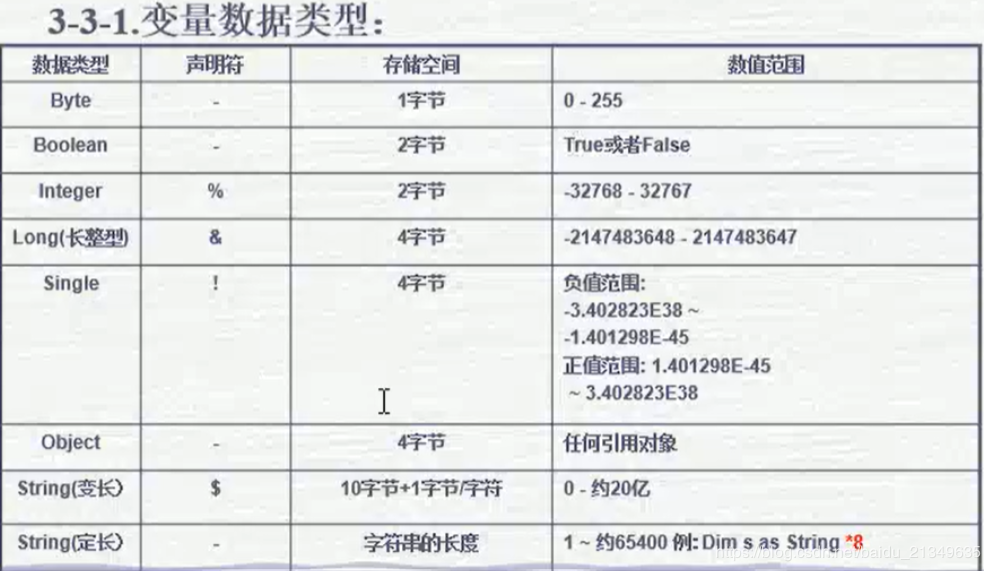
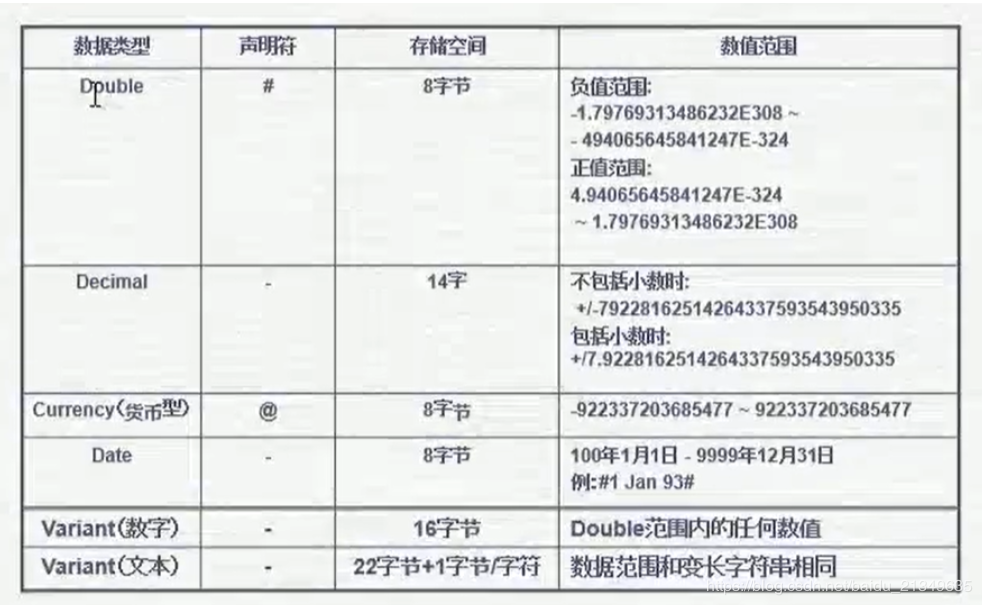
Sub class()
Rem variant是任意类型
Dim name As Variant
name = "Hello World"
Rem debug
Debug.Print name
name = "胡老师好"
Debug.Print name
Rem 定义常量
Const num As Integer = 123
Debug.Print num
End Sub
5.变量的生命周期和定义域
- 定义域: public 和 private
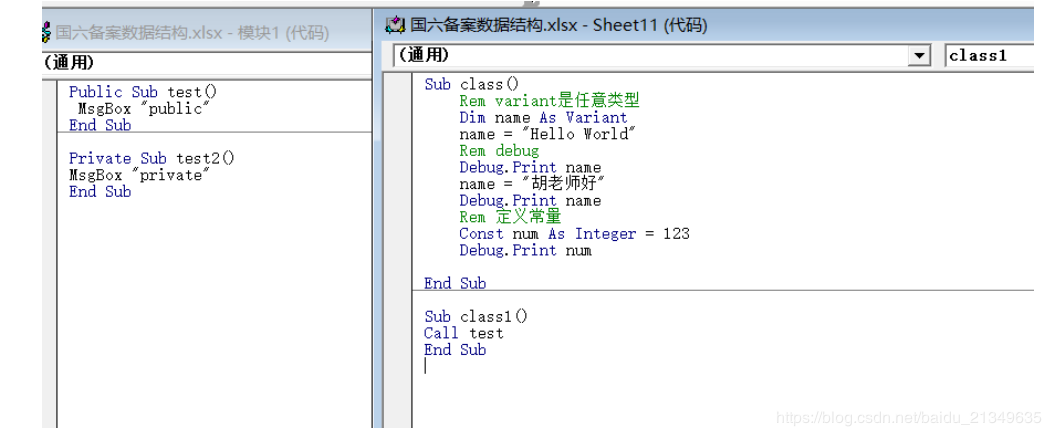
- static 是静态变量
Sub class1()
Dim x As Integer
Rem static 是静态变量
Static y As Integer
x = x + 1
y = y + 1
Debug.Print "x=" & x
Debug.Print "y=" & y
End Sub
6.判断语句
Sub class3()
Dim number As Integer
number = 1
If number > 100 Then
Debug.Print "优秀"
ElseIf number > 95 Then
Debug.Print "良好"
Else
Debug.Print "一般"
End If
End Sub
7.不等于<> , switch case 条件判断
- <> 不等于
Sub class3()
Dim number As String
number = "匹配"
If number > "匹配" Then
Debug.Print "优秀"
ElseIf number <> "匹配" Then
Debug.Print "良好"
End If
End Sub
- switch case
Sub class4()
Dim number As String
number = "匹配"
Select Case number
Case "匹配"
Debug.Print "匹配"
Case "不匹配"
Debug.Print "不匹配"
End Select
End Sub
- boolean类型的使用
Sub class5()
Dim count As Integer
Dim if_f As Boolean
count = 11
if_f = (count = 10)
MsgBox if_f
End Sub
8.循环
- 最简单的循环
Sub class()
Rem 演示循环
Dim count As Integer
For count = 1 To 10
Debug.Print count
Next
Debug.Print "count 循环结束之后的值是 " & count
End Sub

-
循环控制单元格属性
Sub class() Rem 演示循环 Dim count As Integer For count = 2 To 10 If count Mod 2 = 0 Then Rem rang函数代表选中的某列单元格 Rem Interior代表单元格内部的对象 Range("T" & count).Interior.ColorIndex = 1 Else Range("T" & count).Interior.ColorIndex = 3 End If Next Debug.Print "count 循环结束之后的值是 " & count End Sub
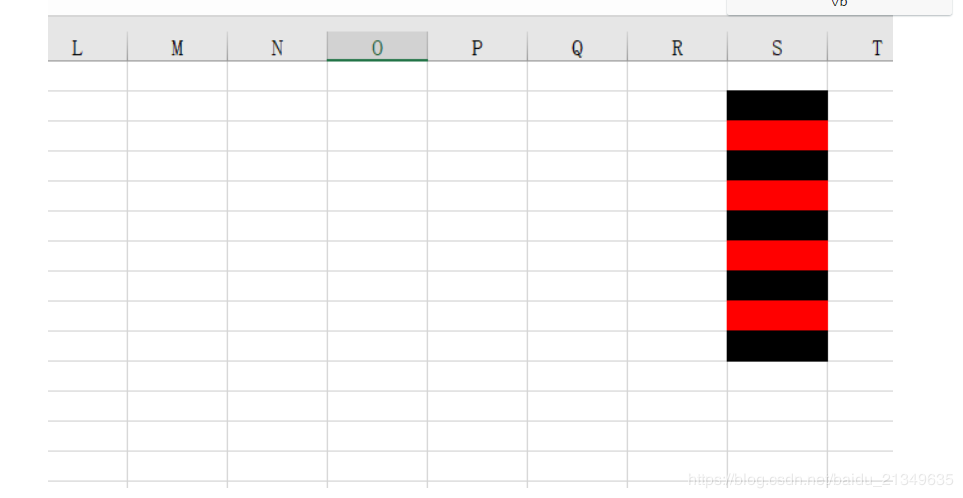
-
循环控制单元格求和
Sub class() Rem 演示循环 Dim COUNT As Integer Dim score As Double For COUNT = 2 To 20 Rem cells的参数 第一个参数代表横行,第2个参数代表竖行 Cells(COUNT, 8) = "=sum(rc[-1]:rc[-6])" Next End Sub
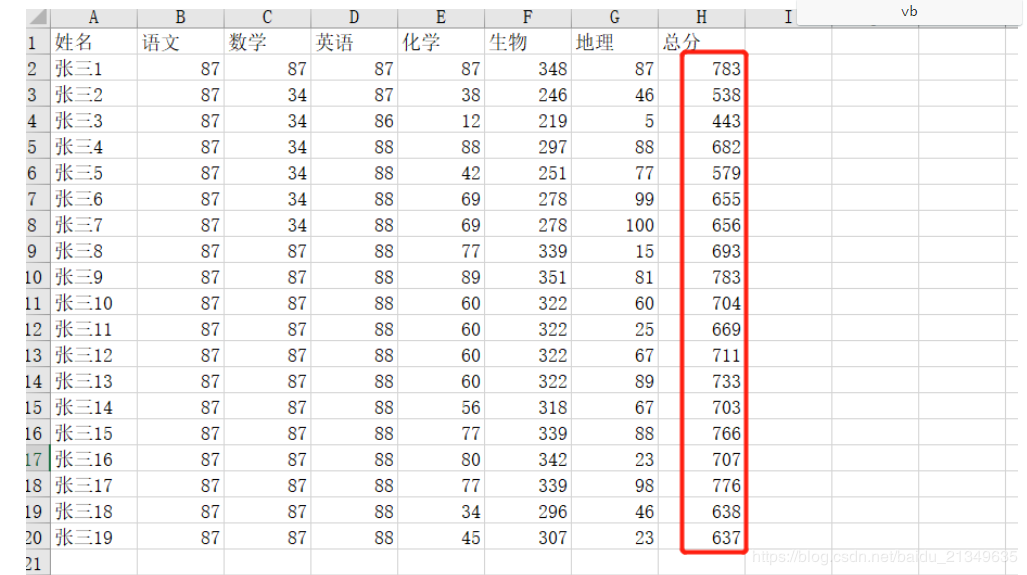
- 循环单元格操作+if
Sub class()
Rem 演示循环
Dim COUNT As Integer
Dim score As Double
For COUNT = 2 To 20
Rem cells的参数 第一个参数代表横行,第2个参数代表竖行
Cells(COUNT, 8) = "=sum(rc[-1]:rc[-6])"
score = Cells(COUNT, 8)
If score > 700 Then
Cells(COUNT, 9) = "秀儿"
ElseIf score > 650 Then
Cells(COUNT, 9) = "良好"
Else
Cells(COUNT, 9) = "小垃圾"
End If
Next
End Sub
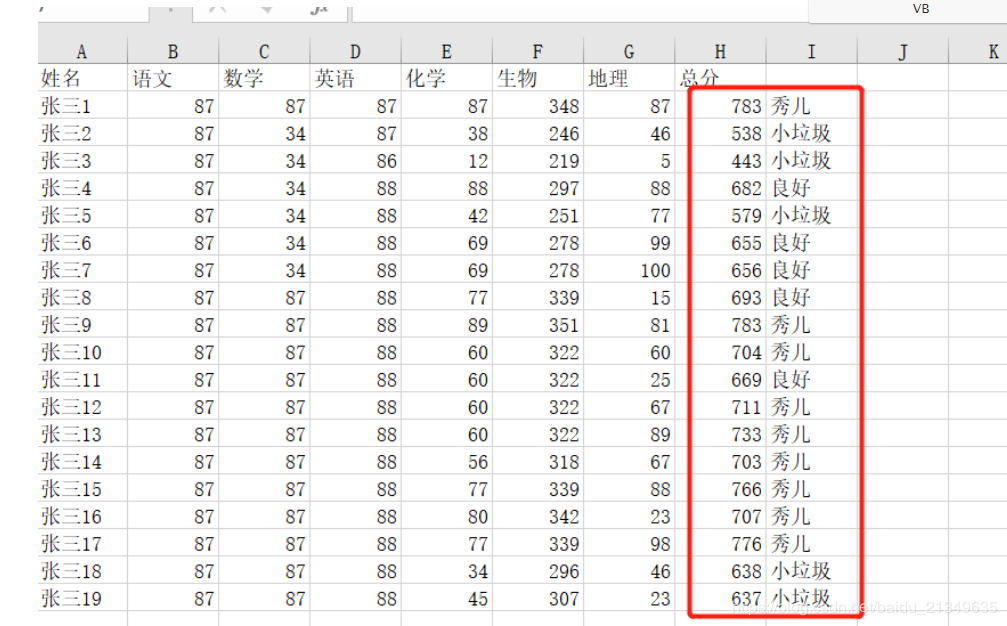
do while
Sub class()
Rem do while 演示
Dim count As Integer
count = 20
Do While count > 10
Debug.Print count
count = count - 1
Debug.Print count
Loop
Rem do .. loop 条件 不演示了
Do
Loop While count > 10
End Sub

退出循环的语句 exit for
使用for循环的时候退出用 exit for
Sub class1()
Dim count As Integer
For count = 1 To 10
If count = 5 Then
Debug.Print "count 退出循环的值是: " & count
Exit For
End If
Debug.Print count
Next
End Sub

退出循环的语句 exit do
使用fo while循环的时候退出用 exit do
Sub class1()
Dim count As Integer
Do While True
count = count + 1
If count > 5 Then
Debug.Print "此时退出循环的值是: " & count
Exit Do
End If
Loop
End Sub

9.数组
Sub class()
Dim arr(2) As Variant
Dim i As Integer
arr(0) = "小明"
arr(1) = 2
arr(2) = True
For i = 0 To 2
Debug.Print arr(i)
Next
End Sub

-
下标越界
Sub class() ' Const i As Integer = 10 ' Dim arr(i) As Variant Rem 可以指明数组的范围奥 起始开始限制了也是下标越界 Dim arr(2 To 5) As Variant arr(1) = 1 Debug.Print arr(1) End Sub
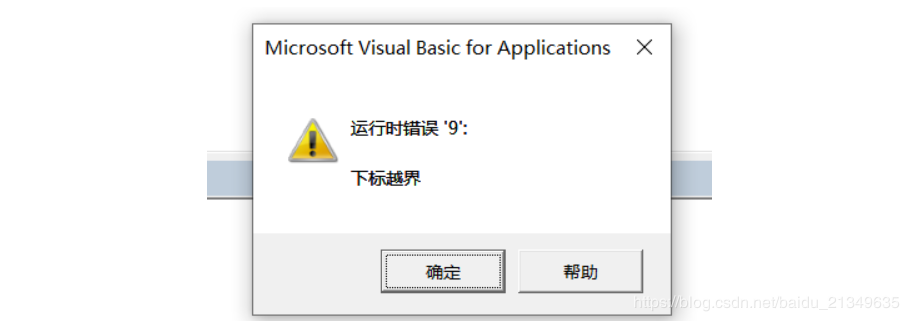
10.二维数组
Sub class()
Dim arr(2 To 5, 3 To 6) As Variant
arr(2, 3) = 1
Debug.Print arr(2, 3)
End Sub

-
遍历循环
Sub class() Dim arr(2 To 5, 3 To 6) As Variant arr(2, 3) = 1 'Debug.Print arr(2, 3) For x = 2 To 5 For y = 3 To 6 Debug.Print arr(2, 3) Next Next End Sub
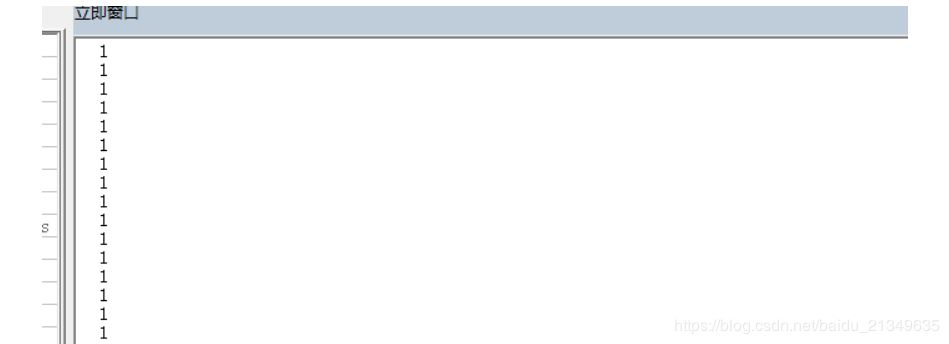
11.操作单元格
2中方式,一种是range,一种是cells
range
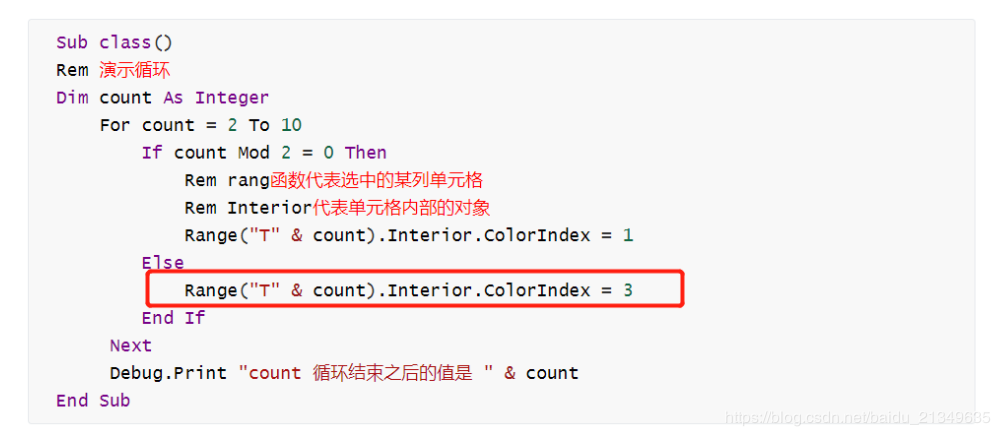
cells
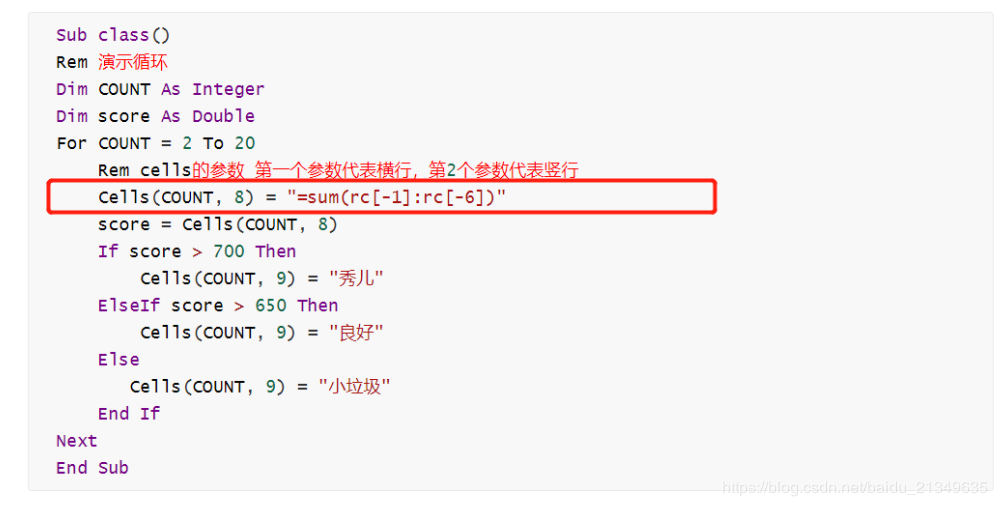
实战
现在掌握了上面的基础知识,基本上可以满足我们最开始的需求
解决思路:循环方式获取单元格中的内容,拼接成 sql 的创建脚本语句即可。
自定义vba脚本生成sql
- 原来的excel模板内容:
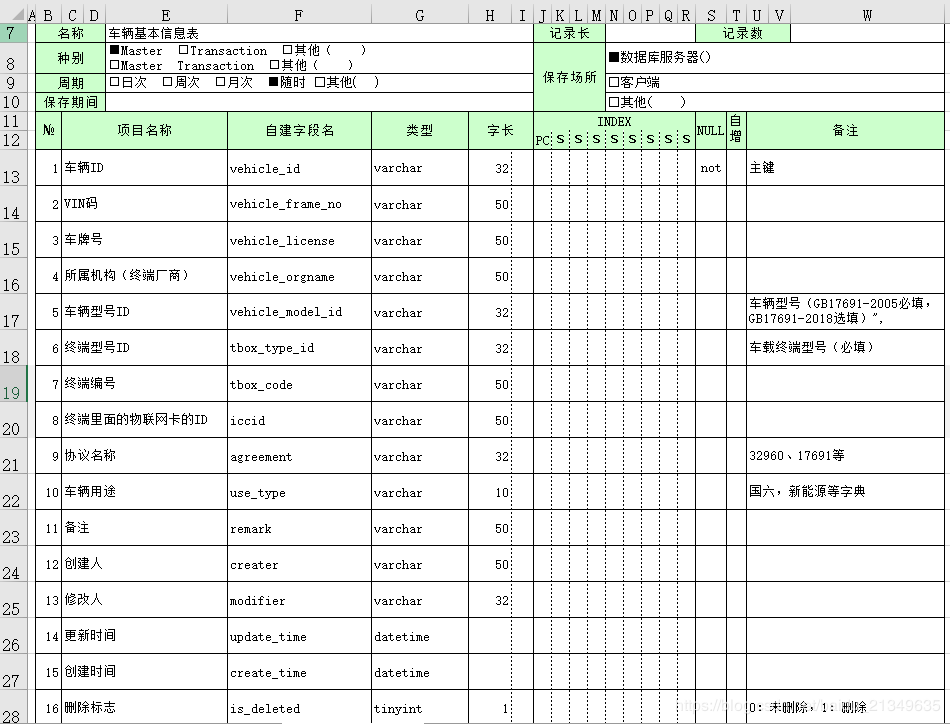
- 目标:输出sql创建表的语句:
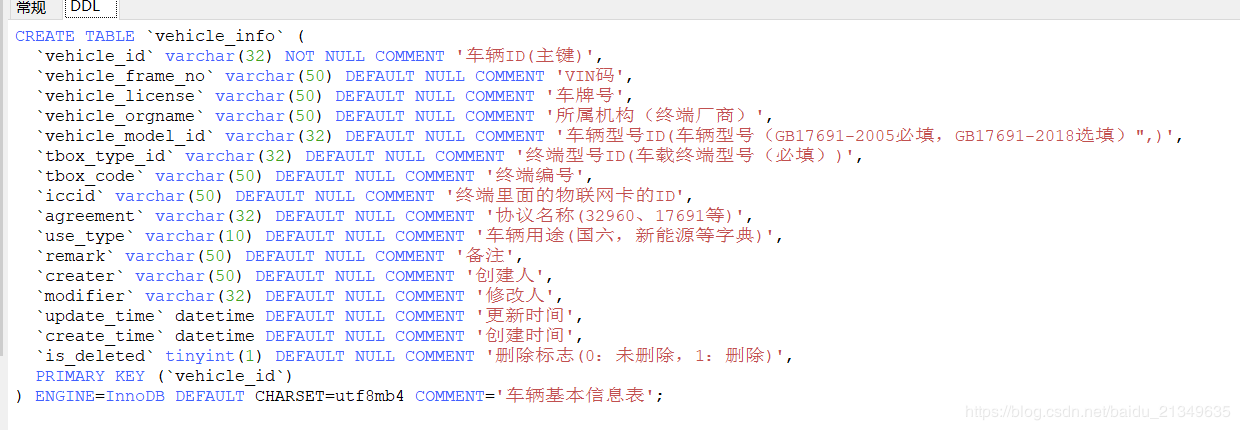
具体实现的脚本:
Public Sub class()
Rem 声明字段row的开始行号
Const startRow As Integer = 13
Rem 声明字段row的结束行号
Const endRow As Integer = 28
Rem 声明表名
Dim tableName As String
tableName = Range("E" & 6)
Rem 声明主键
Dim primaryKey As String
primaryKey = Range("F" & 13)
Rem 声明表名注释
Dim tableComment As String
tableComment = Range("E" & 7)
Rem 声明字段名对应列 英文序号
Dim filedMetaNo As String
filedMetaNo = "F"
Rem 声明字段注释对应对应列 英文序号
Dim commentMetaNo As String
commentMetaNo = "C"
Rem 声明字段备注 对应列的 英文序号
Dim comment2MetaNo As String
comment2MetaNo = "U"
Rem 声明类型 对应列的 英文序号
Dim typeMetaNo As String
typeMetaNo = "G"
Rem 声明字长 对应的列的英文序号
Dim lengthMetaNo As String
lengthMetaNo = "H"
Rem 最终要拼接的sql
Dim sqlStr As String
sqlStr = "CREATE TABLE " & Range("E" & 6) & Chr(13)
sqlStr = sqlStr & "(" & Chr(13)
For count = startRow To endRow
Rem 拼接 字段名
sqlStr = sqlStr & Replace(Range(filedMetaNo & count).Text, " ", "")
Rem 拼接 字段类型(字段长度)
sqlStr = sqlStr & " " & Range(typeMetaNo & count)
If IsEmpty(Range(lengthMetaNo & count)) = False Then
sqlStr = sqlStr & "(" & Range(lengthMetaNo & count) & ") "
End If
Rem 如果是主键,设置NOT NULL COMMENT
If primaryKey = Range(filedMetaNo & count) Then
sqlStr = sqlStr & " NOT NULL COMMENT "
Else
Rem 拼接 DEFAULT NULL COMMENT '字段名称注释(字段备注)'
sqlStr = sqlStr & " DEFAULT NULL COMMENT "
End If
sqlStr = sqlStr & "'" & Range(commentMetaNo & count)
If IsEmpty(Range(comment2MetaNo & count)) = False Then
sqlStr = sqlStr & "(" & Range(comment2MetaNo & count) & ")"
End If
sqlStr = sqlStr & "'"
sqlStr = sqlStr & "," & Chr(13)
Next
sqlStr = sqlStr & "PRIMARY KEY (" & primaryKey & ")" & Chr(13)
sqlStr = sqlStr & ")ENGINE=InnoDB DEFAULT CHARSET=utf8mb4 COMMENT='" & tableComment & "'" & Chr(13)
Debug.Print sqlStr
End Sub
显示结果:
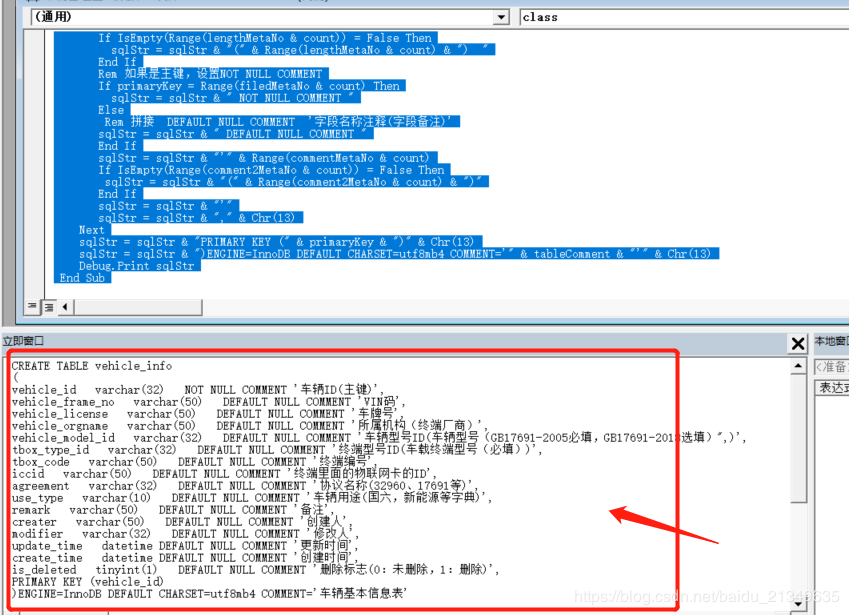
在navicat中运行
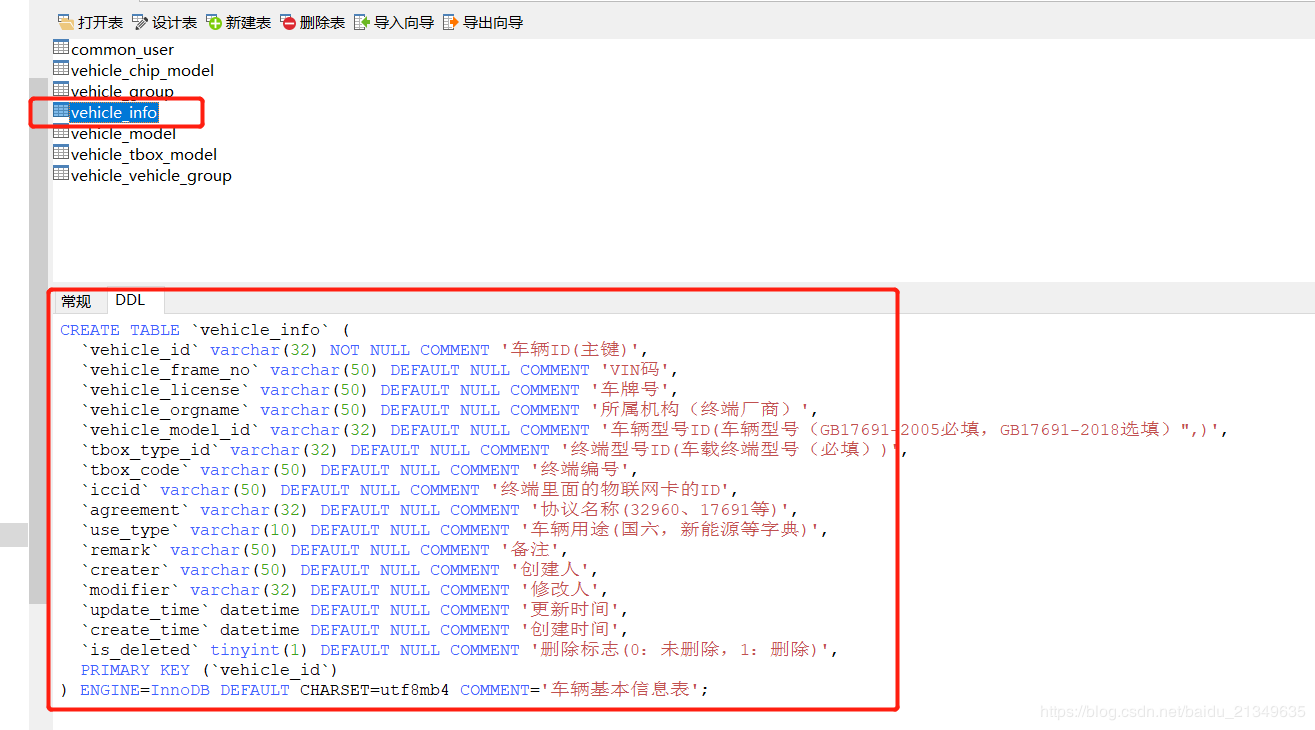
显示已经把mysql数据库的表结构导入数据库了。
见证奇迹的时刻(如何使用脚本)
脚本只需要改一个地方:
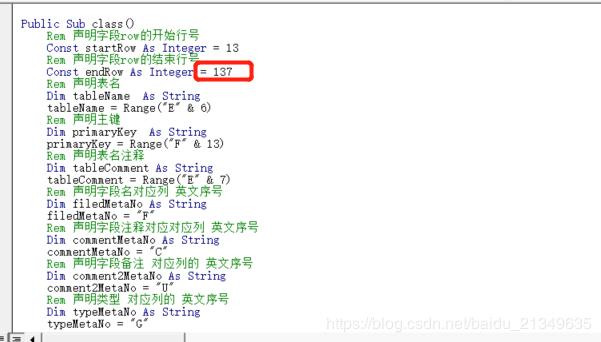
对应这里的行号:

即可。
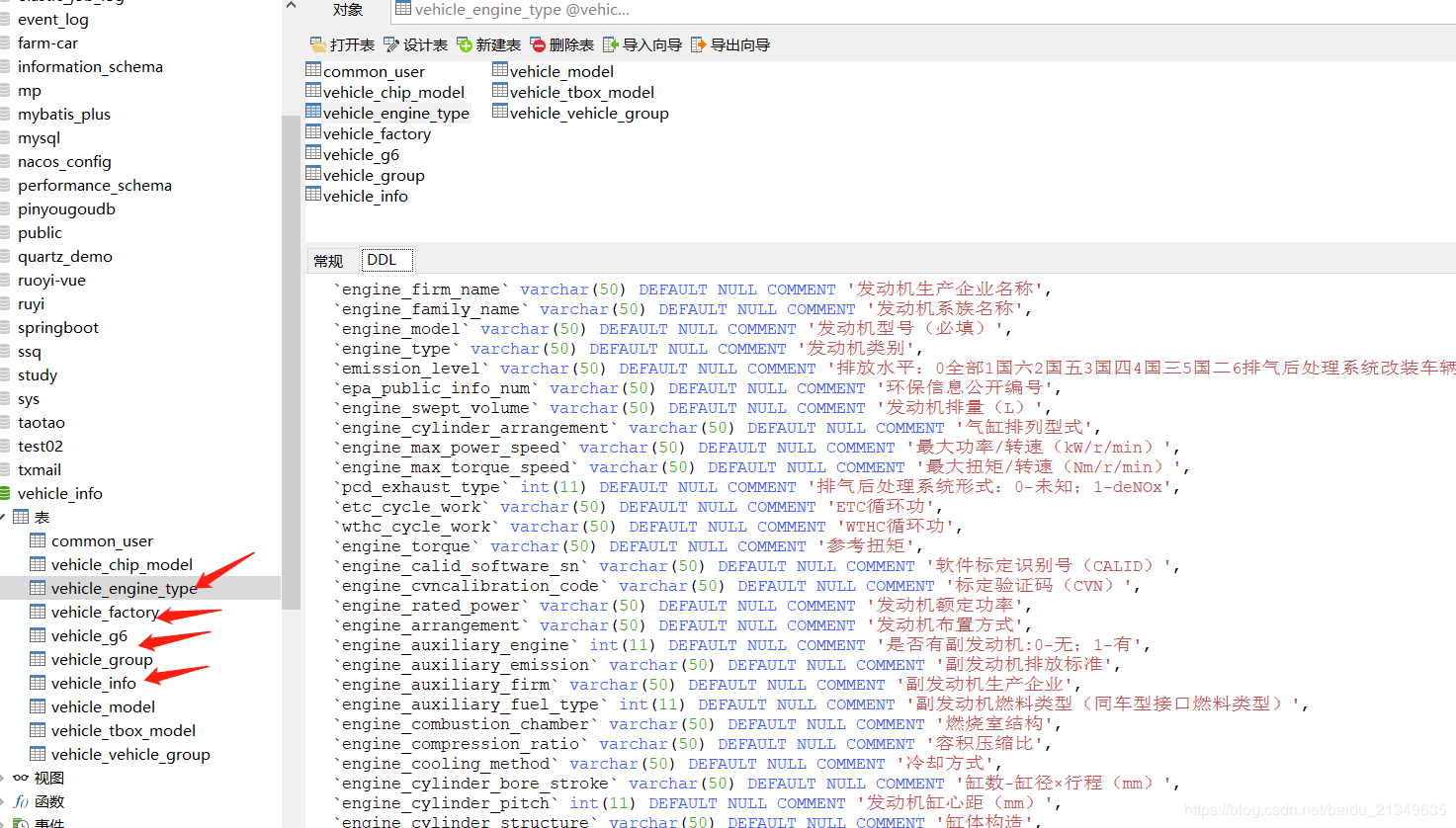
以上即是用脚本生成的4张表效果图。
个人微信公众号:
搜索: 怒放de每一天
不定时推送相关文章,期待和大家一起成长!!

完
谢谢大家支持!
posted on 2020-06-06 00:14 怒放de生命2010 阅读(1462) 评论(0) 编辑 收藏 举报

